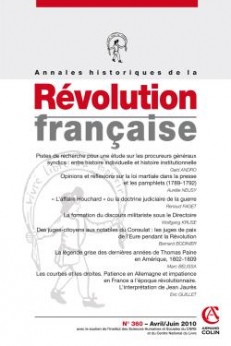
Annales historiques de la Révolution française n° 360 (2/2010)
Pour acheter ce numéro, contactez-nous
Recevez les numéros de l'année en cours et accédez à l'intégralité des articles en ligne.
Lorsque les constituants établissent la nouvelle pyramide administrative française dans les premiers mois de la Révolution, ils confient la mise en application de la loi au procureur général syndic du département. Élu par les assemblées électorales départementales, le procureur général syndic est théoriquement la synthèse institutionnelle de deux objectifs difficilement conciliables : l’exigence démocratique locale et le contrôle du territoire par l’exécutif central. Cette tension propre à la fonction laisse subsister un certain flou quant aux prérogatives réelles de ces hommes. Selon les départements, il apparaît comme un administrateur secondaire sans grand pouvoir de décision ou au contraire comme un personnage central de la construction identitaire départementale. Une unité apparaît cependant lors de l’analyse de leur recrutement et de leurs carrières. L’approche prosopographique permet ainsi de replacer cette institution dans la problématique plus large de la construction de l’État à travers la formation d’une nouvelle élite administrative.
When deputies of the Constituent Assembly established a new administrative pyramid in France, in the first months of the Revolution, they entrusted the application of these laws to the « procureur général syndic » of each department. Elected by the departmental electoral assemblies, the « procureur général syndic » was theoretically the institutional synthesis of two objectives, difficult to reconcile : the local democratic imperative and the territorial control exercised by a central executive. The tension inherent in this administrative post maintained a certain ambiguity concerning the real powers of these men. Depending on the department, the « procureur général syndic » appears either as a secondary administrator without much power of decision or as a key element in the construction of a departmental identity. A unity appears, however, when one analyses their recrutment and their careers. The prosopographical approach places this institution into a larger« problematique » of the construction of the State by the formation of a new administrative elite.